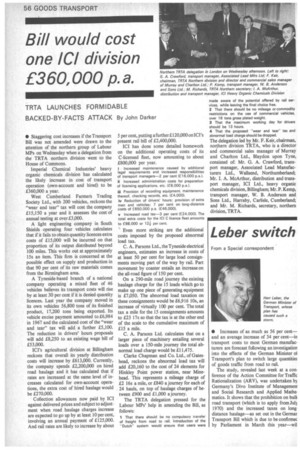Bill would cost one ICI division £360,000 p. a.
Page 58

If you've noticed an error in this article please click here to report it so we can fix it.
TRTA LAUNCHES FORMIDABLE BACKED-BY-FACTS ATTACK By John Darker
• Staggering cost increases if the Transport Bill was not amended were drawn to the attention of the northern group of Labour MPs on Wednesday when a delegation from the TRTA northern division went to the House of Commons.
Imperial Chemical Industries' heavy organic chemicals division has calculated the likely increase in cost of transport operation (own-account and hired) to be £360,000 a year.
West Cumberland Farmers Trading Society Ltd., with 200 vehicles, reckons the "wear and tear" tax will cost the company £15,150 a year and it assesses the cost of annual testing at over £3,000.
A light engineering company in South Shields operating four vehicles calculates that if it fails to obtain quantity licences extra costs of £15,000 will be incurred on that proportion of its output distributed beyond 100 miles. This works out at approximately 15s an item. This firm is concerned at the possible effect on supply and production in that 90 per cent of its raw materials comes from the Birmingham area.
A Tyneside-based branch of a national company operating a mixed fleet of 46 vehicles believes its transport costs will rise by at least 30 per cent if it is denied quantity licences. Last year the company moved in its own vehicles 56,800 tons of its finished product, 17,200 tons being exported. Its vehicle excise payment amounted to £6,984 in 1967 and the calculated cost of the "wear and tear" tax will add a further £5,100. The reduction in drivers' hours proposals will add E8,250 to an existing wage bill of £53,000.
ICI's agricultural division at Billingham reckons that overall its yearly distribution costs will increase by £613,000. Currently, the company spends £2,200,000 on hired road haulage and it has calculated that if rates are increased at the same level of increases calculated for own-account operations, the extra cost of hired haulage would be £270,000.
Collection allowances now paid by ICI against delivered prices and subject to adjustment when road haulage charges increase are expected to go up by at least 10 per cent, involving an annual payment of £125,000. And rail rates are likely to increase by about 5 per cent, putting a further £120,000 on ICI's present rail bill of £2,400,000.
ICI has done some detailed homework on the additional operating costs of its C-licensed fleet, now amounting to about £800,000 per year.
i Increased maintenance caused by additional legal requirements and increased responsibilities of transport managers-2 per cent (£16,000 pa.).
ii Increased administration costs for preparation of licensing applications, etc. 1E8,000 p.a.).
iii Provision of recording equipment, maintenance thereof, checking records, etc. (£4.000).
iv Reduction of drivers' hours; provision of extra men and vehicles; 7 per cent on long-distance costs of £650.000 p.a. (£46.000).
v Increased road tax-3 per cent (£24,000). The total extra costs for the ICI C licence fleet amounts
to £98,000 or 123,-E. per cent.
Even more striking are the additional costs imposed by the proposed abnormal load tax.
C. A. Parsons Ltd., the Tyneside electrical engineers, estimates an increase in costs of at least 50 per cent for large load consignments moving part of the way by rail. Part movement by coaster entails an increase on the all-road figure of 150 per cent.
On a 290-mile road journey the existing haulage charge for the 15 loads which go to make up one piece of generating equipment is £7,050. The abnormal load taxation on these consignments would be £6,916 10s, an increase of virtually 100 per cent. The total tax a mile for the 15 consignments amounts to £23 17s so that the tax is at the other end of the scale to the cumulative maximum of £15 a mile.
C. A. Parsons Ltd. calculates that on a larger piece of machinery entailing several loads over a 150-mile journey the total abnormal load charge would be £11,475.
Clarke Chapman and Co. Ltd., of Gateshead, reckons the abnormal load tax will add £20,160 to the cost of 24 elements for Hinkley Point power station, near Minehead. This represents a mileage charge of £2 16s a mile, or £840 a journey for each of 24 hauls, on top of haulage charges of between £900 and £1,000 a journey.
The TRTA delegation pressed for the Labour MPs' help in amending the Bill, as follows:
1 That there should be no compulsory transfer of freight from road to rail. Introduction of the "Dutch" system would ensure that users were
made aware of the potential offered by rail services, while leaving the final choice free.
2 That there should be no mileage or commodity restrictions on the use of commercial vehicles, over 16 tons gross plated weight.
3 That the maximum working day for drivers should be 13 hours.
4 That the proposed "wear and tear" tax and abnormal load charge should be dropped.
The delegation led by Mr. F. Keir, chairman, northern division TRTA, who is a director and commercial sales manager of Murray and Charlton Ltd., Blaydon upon Tyne, consisted of: Mr. G. A. Crawford, transport manager, Associated Lead Manufacturers Ltd., Wallsend, Northumberland; Mr. I. A. McArthur, distribution and transport manager, ICI Ltd., heavy organic chemicals division, Billingham; Mr. P. Kemp, transport manager, W. B. Anderson and Sons Ltd., Harraby, Carlisle, Cumberland; and Mr. M. Richards, secretary, northern division, TRTA.




































































































































































































